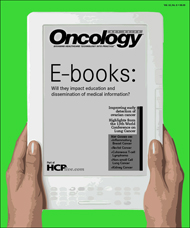Publication
Article
ONCNG Oncology
The Illusive Universal EHR
Author(s):
The quest for a useful, robust, and universally available electronic health record (EHR) has generated considerable momentum over the past several years.
The quest for a useful, robust, and universally available electronic health record (EHR) has generated considerable momentum over the past several years. The federal government’s recent decision to allocate billions of dollars to this effort emphasizes the importance placed on this single concept to improve the quality of medical care and reduce the staggering current and projected future costs of delivering healthcare in the United States.
The process of fully converting paper documents to electronic ones is daunting, especially when you consider the multiple other aspects of our daily lives that have been profoundly changed by the ongoing advancements in information technology, including finance, education, and daily communication. According to a report recently published in the New England Journal of Medicine, less than 2% of US hospitals have a “comprehensive electronic records system.”1 A larger percentage of hospitals were found to have at least one component of an EHR, such as order entry, but this is a long way from what can be reasonably classified as a robust system that permits ease of use or portability. This current state-of-affairs can be attributed to multiple factors, including the truly underappreciated costs associated with converting an exceedingly large number of legacy systems and historical documents to a standard digital format, which is absolutely necessary for successful implementation of an EHR system. There has also been little (if any) incentive for commercial healthcare-related vendors to attempt to develop or comply with a “universal standard.” Vendors want to protect their investments, and if it were easy for companies to link their hardware or software to an existing system, despite it having been manufactured by another vendor, hospitals and other institutions would no longer have to purchase future hardware and software from the original vendor. The establishment of mandated and well-publicized governmental information technology standards in healthcare will no doubt go a long way to increase the competitiveness and cost-effectiveness of the various components of an integrated and comprehensive EHR. One often discussed goal of EHRs is the ability of patients to easily and inexpensively move their accurate and up-to-date health-related information from one provider to another to optimize communication regarding their medical history and current medical condition, which will also translate to saving considerable healthcare dollars. Consider how much would be saved if a consultant physician did not have to order another chest CT scan because he or she had access to the report and digitalized images of a chest CT scan that had been obtained by the patient a week earlier at an outside hospital or clinic.
While the goal of implementing an EHR system is unquestionably laudable and must certainly be pursued, one must pause to consider the issue of both patient privacy and the security of electronically stored data. Consider for a moment if your medical record was among those of a State of Virginia database that was “tapped into” by hackers who demanded a $10,000,000 “ransom,” or they would sell the information they had gleaned.2 According to a news report, the information in their possession included the use of prescription narcotic medications, and the release of this sensitive information into the public domain could cause the patients taking these drugs considerable personal embarrassment, or worse.
Clearly, we have a way to go before it is possible to declare that assembling personal medical records into an electronic format and maintained by a third-party (not the physician or hospital you have personally selected to protect your interests) is completely secure.
Maurie Markman, MD, is Editor-in-Chief of Oncology Net Guide and Vice President of Clinical Research for the University of Texas MD Anderson Cancer Center in Houston, Texas.
References
1. Jha AK, DesRoches CM, Campbell EG, et al. Use of electronic
health records in U.S. Hospitals. N Engl J Med. 2009;360:1628-1638.
2. Wall Street Journal. Available at: http://blogs.wsj.com/health/2009/05/08/hackers-may-have-stolen-patient-data/tab/ print. Accessed May 18, 2009.
